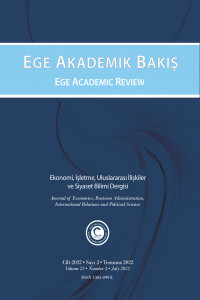Abstract
References
- Almond, G., & Verba, S., (1963). The civic culture: Political attitudes and democracy in five nations. Princeton, NJ: Princeton University Press.
- Anderson, C. J., & Guillory, C. A. (1997). Political institutions and satisfaction with democracy: A cross-national analysis of consensus and majoritarian systems. American Political Science Review, 91(1), 66-81.
- Barnes, S. H., & Farah, B. (1972). National representatives and constituency attitudes in Germany and Italy. In delivery at the 1972 Annual Meeting of the American
- Benoit, K., & Laver, M. (2007). Estimating party policy positions: Comparing expert surveys and hand-coded content analysis. Electoral Studies, 26(1), 90-107.
- Blais, A., & Bodet, M. A. (2006). Does proportional representation foster closer congruence between citizens and policy makers?. Comparative Political Studies, 39(10), 1243-1262.
- Bratton, M., & Mattes, R. (2001). Support for Democracy in Africa: intrinsic or instrumental?. British Journal of Political Science, 447-474.
- Budge, I., & McDonald, M. D. (2007). Election and party system effects on policy representation: bringing time into a comparative perspective. Electoral Studies, 26(1), 168-179.
- Castles, F. G., & Mair, P. (1984). Left–right political scales: Some ‘expert’judgments. European Journal of Political Research, 12(1), 73-88.
- Dowling, J., & Pfeffer, J. (1975). Organizational legitimacy: Social values and organizational behavior. Pacific sociological review, 18(1), 122-136.
Abstract
According to the legitimacy approach of political culture research the public’s approval of a particular regime and disapproval of its alternatives provide support for that regime. Both theoretical and empirical evidence suggest that this support is important for the legitimacy of the regime. This research attempts to map publics’ approval of democracy and disapproval of three regimes that are known to be alternatives of democracy by examining the three major political parties’, namely the Justice and Development Party (JDP), the Republican People’s Party (RPP) and the National Action Party (NAP), manifesto documents as well as their voter bases across the successive seventeen general elections in the modern Turkish political history. It employed quantitative research methods and the World Values Survey for individual level and Manifesto Project for party level data. Findings suggest that voters are more stable than their parties across time in terms of their pro-democratic stance. Also, that except for minor differences, support for democracy and each of three alternative of it occupy almost the identical places in the minds of the three party electorates. Moreover, in this picture, democracy is clearly viewed as an alternative to the three political regimes. In a causal relationship however, some important differences can be observed across parties when support for its alternatives are viewed as determinants of support for democracy. The last major finding suggests that these three political parties’ pro-democratic stances as identified in their manifesto documents do not represent their voters’ pro-democratic views.
References
- Almond, G., & Verba, S., (1963). The civic culture: Political attitudes and democracy in five nations. Princeton, NJ: Princeton University Press.
- Anderson, C. J., & Guillory, C. A. (1997). Political institutions and satisfaction with democracy: A cross-national analysis of consensus and majoritarian systems. American Political Science Review, 91(1), 66-81.
- Barnes, S. H., & Farah, B. (1972). National representatives and constituency attitudes in Germany and Italy. In delivery at the 1972 Annual Meeting of the American
- Benoit, K., & Laver, M. (2007). Estimating party policy positions: Comparing expert surveys and hand-coded content analysis. Electoral Studies, 26(1), 90-107.
- Blais, A., & Bodet, M. A. (2006). Does proportional representation foster closer congruence between citizens and policy makers?. Comparative Political Studies, 39(10), 1243-1262.
- Bratton, M., & Mattes, R. (2001). Support for Democracy in Africa: intrinsic or instrumental?. British Journal of Political Science, 447-474.
- Budge, I., & McDonald, M. D. (2007). Election and party system effects on policy representation: bringing time into a comparative perspective. Electoral Studies, 26(1), 168-179.
- Castles, F. G., & Mair, P. (1984). Left–right political scales: Some ‘expert’judgments. European Journal of Political Research, 12(1), 73-88.
- Dowling, J., & Pfeffer, J. (1975). Organizational legitimacy: Social values and organizational behavior. Pacific sociological review, 18(1), 122-136.
Details
| Primary Language | English |
|---|---|
| Subjects | Political Science |
| Journal Section | Articles |
| Authors | |
| Early Pub Date | June 22, 2022 |
| Publication Date | July 1, 2022 |
| Acceptance Date | June 9, 2022 |
| Published in Issue | Year 2022 Volume: 22 Issue: 3 |


